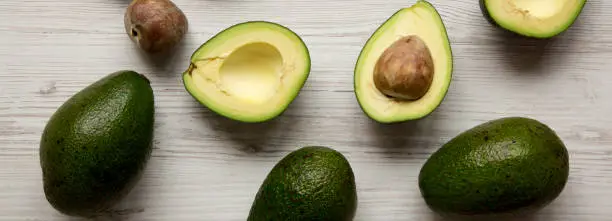Avocados are no longer just a trendy food item; they’ve become a nutritional powerhouse in daily diets around the world. Packed with healthy fats, vitamins, and fiber, this creamy fruit has earned its place in meals ranging from breakfast toast to dinner salads. But what happens when you eat a whole avocado every day? Is it beneficial, or could it be too much of a good thing?
In this article, we’ll explore the daily impact of consuming a whole avocado, its nutritional advantages, potential drawbacks, and how to incorporate it into a balanced diet for maximum benefit.
1. Nutritional Powerhouse: The Benefits of Daily Avocado Consumption
Avocados are packed with nutrients that can significantly contribute to overall health when consumed regularly.
a. Heart-Healthy Fats
Avocados are rich in monounsaturated fats, particularly oleic acid. These fats are known to:
- Support cardiovascular health.
- Reduce levels of LDL (“bad”) cholesterol.
- Increase HDL (“good”) cholesterol.
💡 Research Highlight (Blue Box):
A 2015 study published in the Journal of the American Heart Association found that consuming one avocado daily as part of a moderate-fat diet significantly reduced LDL cholesterol in overweight individuals.
b. Essential Micronutrients
Avocados are a nutrient-dense fruit, offering:
- Potassium: Helps regulate blood pressure and heart function.
- Vitamin K: Supports bone health and blood clotting.
- Vitamin E and C: Act as antioxidants to combat oxidative stress.
- B-Vitamins: Play a key role in energy production and metabolism.
c. Fiber for Digestive Health
One avocado contains about 10 grams of fiber, contributing to daily fiber needs. This aids in digestion, promotes gut health, and helps maintain feelings of fullness.
d. Potential Disease Prevention
The antioxidants in avocados, including lutein and zeaxanthin, are linked to improved eye health and reduced risk of age-related macular degeneration. Regular consumption may also reduce inflammation, a key factor in chronic diseases.
2. The Calorie Equation: Balancing Benefits with Energy Needs
While avocados are nutrient-rich, they’re also calorie-dense. A single avocado contains around 300 calories, making it essential to balance its consumption within your overall caloric intake.
a. Weight Management Considerations
- For Active Individuals: The calories in an avocado can serve as an excellent energy source.
- For Sedentary Individuals: Overconsumption without balancing physical activity could lead to weight gain.
💡 Fun Fact (Blue Box):
Avocados are more calorie-dense than most fruits. For comparison, a medium-sized banana has about 100 calories, while an avocado triples that amount.
b. Smart Pairings for a Balanced Diet
Incorporate avocados with low-calorie, nutrient-dense foods like:
- Leafy greens.
- Whole grains.
- Lean proteins.
This ensures you enjoy avocados’ benefits without exceeding your calorie needs.
3. Potential Drawbacks of Daily Avocado Consumption
While avocados are packed with nutrients, eating a whole avocado daily isn’t without considerations.
a. Caloric Overload
For individuals with lower energy needs, adding 300 calories daily could contribute to weight gain if not accounted for in overall caloric intake.
b. Digestive Sensitivity
Avocados are high in fiber, which is beneficial but may cause digestive discomfort for some individuals, such as bloating or gas, especially if fiber intake is suddenly increased.
c. Environmental Concerns
The popularity of avocados has led to significant environmental impacts, including:
- High water usage (approximately 60 gallons per avocado).
- Deforestation in major producing regions.
💡 Sustainability Highlight (Blue Box):
Experts recommend supporting sustainably farmed avocados to minimize environmental impact.
4. Recommendations for Incorporating Avocados into Your Diet
If you’re planning to make avocados a daily staple, here are some tips to maximize their benefits:
a. Portion Control
While eating an entire avocado is fine for most active individuals, consider consuming half if you’re monitoring calorie intake.
b. Meal Ideas
- Breakfast: Add avocado slices to whole-grain toast with a poached egg.
- Lunch: Toss avocado chunks into a quinoa salad.
- Dinner: Use mashed avocado as a healthier alternative to butter or mayo.
c. Combine with Diverse Foods
Pair avocados with high-protein foods like eggs, chicken, or beans to create a balanced meal.
5. Avocado as Part of a Balanced Diet
For most adults, eating a whole avocado daily poses minimal health risks when balanced with an active lifestyle and mindful calorie management. However, the key lies in variety. A diet rich in diverse whole foods ensures you receive a full spectrum of nutrients.
💡 Expert Insight (Blue Box):
Nutritionist Dr. Emily Carter says, “Avocados are an excellent addition to any diet, but they shouldn’t crowd out other nutrient-rich foods. Balance is essential.”
6. FAQs About Daily Avocado Consumption
1. Can eating a whole avocado every day cause weight gain?
It depends on your overall calorie intake. If you balance it with an active lifestyle and a healthy diet, it’s unlikely to cause weight gain.
2. Are avocados good for heart health?
Yes! The monounsaturated fats in avocados help maintain healthy cholesterol levels and reduce heart disease risk.
3. Can I eat avocados if I’m on a low-calorie diet?
Yes, but consider portion control—half an avocado may be a better fit for lower-calorie diets.
4. Are there any risks to eating avocados daily?
Aside from potential calorie concerns, some individuals may experience mild digestive discomfort due to their high fiber content.
5. What’s the best way to store avocados?
Store unripe avocados at room temperature. Once ripe, refrigerate to slow further ripening.
Conclusion
Eating a whole avocado daily can be a nutritious addition to your diet, offering heart-healthy fats, essential vitamins, and fiber. However, balance and moderation are key. By pairing avocados with other nutrient-dense foods and staying mindful of your calorie needs, you can enjoy their benefits without compromising your health goals.
So, is a daily avocado right for you? It’s worth giving it a try—your body (and taste buds) might just thank you! 🥑
